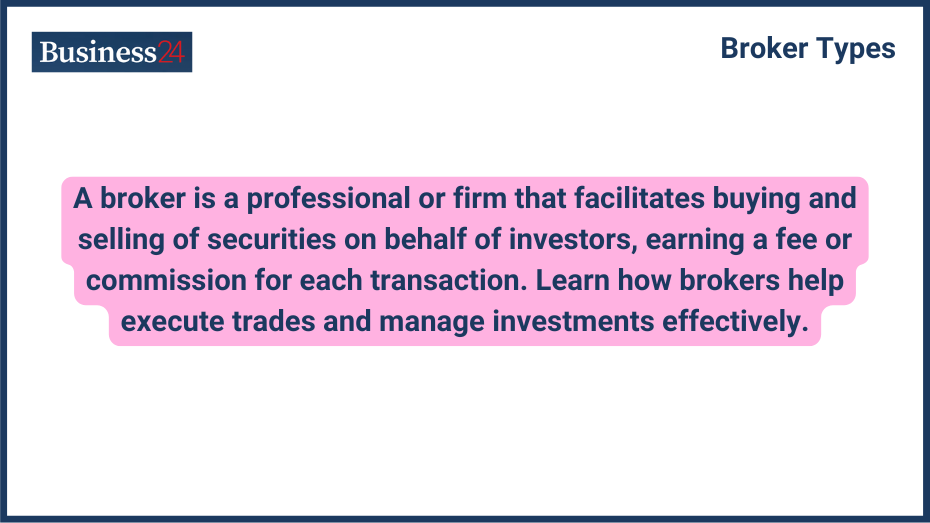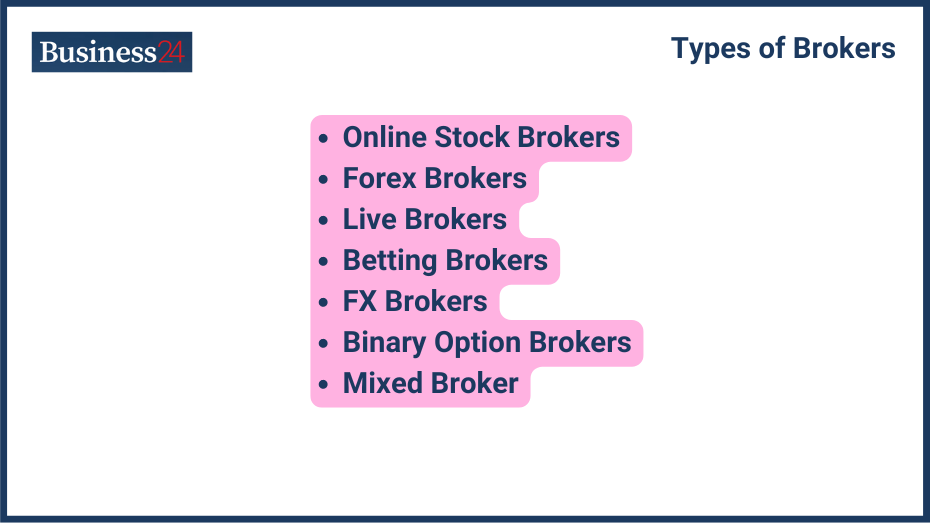
A broker is an intermediary that helps to complete transactions between two parties. They act as a go-between, connecting buyers and sellers to help them complete a deal. Different traders have different needs according to their trading system and the type of asset they are trading, which is why various types of brokers are available in the market.
Overview of Intermediary Services By Brokers
Brokers provide a range of services, including:
- Market Knowledge: Brokers have in-depth knowledge of their market, enabling them to provide valuable insights to clients. They help clients understand market trends, identify potential opportunities, and assess risks. Brokers can also provide clients with information on market conditions, economic indicators, and industry news.
- Negotiation: They negotiate on behalf of their clients to secure favorable terms. Brokers use their expertise to negotiate prices, conditions, and other aspects of the transaction.
- Paperwork: Brokers assist with the necessary paperwork and documentation associated with transactions. This includes preparing contracts, applications, and other legal documents. Brokers can help clients navigate the complex legal and administrative transaction processes.
- Compliance: in regulatory compliance, brokers ensure compliance with relevant regulations and laws. Brokers must adhere to strict rules to protect their clients and maintain professional licenses.
- Risk Management: In some cases, brokers help clients manage risks associated with their transactions. They advise on risk mitigation strategies and help clients understand the potential consequences of their decisions.
Types of Brokers

Stock Brokers
There are two types of stock brokers:
- Full-Service Brokers: Full-service brokers offer various services, including investment advice, research, and portfolio management. They charge higher fees but provide personalized attention. Full-service brokers can help clients develop investment strategies, select appropriate securities, and manage their portfolios. They can also provide clients with customized advice, market analysis, and research.
- Discount Brokers: Discount brokers offer basic brokerage services at a lower cost. They are suitable for investors who are comfortable making their own investment decisions. Discount brokers provide access to trading platforms, market data, and basic execution services.
Forex Brokers
Forex brokers provide users with currency trading using different instruments. They provide access to trading platforms, market analysis, and execution services. FX brokers charge commissions or earn revenue through the spread between the bid and ask prices. They provide traders with access to advanced trading tools, market research, and educational resources.
Check out the best forex brokers here.
Online Stock Brokers
Online stock brokers are platforms where investors can buy and sell stocks. Whether you’re just starting to invest or you’re an experienced trader, these brokers offer a simple way to get involved in the stock market. As you gain experience, you may want to explore more complex investment options, such as ETFs, bonds, and funds. Some brokers accommodate these needs, while others focus primarily on stocks.
When you purchase stocks through an online broker, you own those stocks. This ownership comes with important shareholder rights, including the ability to receive dividends, which can increase your investment returns. This differs significantly from betting brokers, where you don’t own the asset—you’re just betting on price movements.
Explore the Best Online Stock Brokers: Check out the top brokers reviewed.
Live Brokers: A Personalized Trading Experience
Live brokers provide a more hands-on approach. They are professionals who execute trades on your behalf and can offer personalized advice. Live brokers are ideal for complex transactions, evaluating trade ideas, and handling exotic products. However, this personalized service often comes at a higher cost.
While live brokers can be extremely helpful, there is a common critique: some may prioritize making trades to increase their commissions, rather than acting in the client’s best interest. The quality of service varies by broker and brokerage firm.
Betting Brokers: Trading Without Ownership
Betting brokers allow you to speculate on the price movements of assets without owning the underlying stock. Think of them as bookies for the financial markets. With betting brokers, you can place bets on a wide variety of assets, from stocks to commodities, often with the advantage of leverage, allowing you to make larger bets with less capital.
Common types of betting brokers include spread betting, contract for difference (CFD) brokers, and certificates. However, it’s crucial to verify whether you’re getting real market access or just the ability to place a bet on price movements.
FX Brokers: Currency Trading Made Easy
FX brokers specialize in currency trading (Forex). Unlike traditional currency exchange, most FX brokers operate similarly to betting brokers, allowing you to bet on whether currency pairs (like EUR/USD) will rise or fall. The key advantages of FX brokers are access to a wide range of currencies and the ability to trade with leverage.
FX brokers often target new traders with flashy ads, but it’s important to understand that Forex trading is highly competitive and can be difficult to master long-term.
Binary Option Brokers: Avoid These High-Risk Trades
Binary options are high-risk derivatives that we recommend avoiding. While they are simple to understand—betting on whether an asset will reach a specific price by a certain time—most traders end up paying too much for the option due to misleading perceptions of value. There are many better ways to invest and trade, so steer clear of binary options.
Check out the best binary options brokers here.
Understanding Broker Types
Brokers often mix different services. A brokerage firm might offer both live broker services and online stock trading, while others provide FX trading and CFDs as part of their betting broker services. It’s essential to understand the broker types to choose the right one for your trading needs.
Why Is Ownership Important?
Owning stocks gives you several advantages, including the potential for dividend payments and a say in company decisions through voting rights. Betting on stock price movements doesn’t offer these benefits, making stock ownership a better long-term investment strategy.
Can Stock Brokers Offer More Than Just Stocks?
The term “online stock broker” can be misleading, as many stock brokers offer other financial products like ETFs, bonds, and mutual funds. However, brokers that trade more complex products almost always offer stock trading as well.
Regulation and Licensing
Governing Bodies and Standards: Brokers are subject to regulation and oversight by various governing bodies. These bodies establish standards and rules to protect consumers and ensure fair practices. Examples of governing bodies in the West include:
- Financial Industry Regulatory Authority (FINRA): FINRA regulates broker-dealers and their representatives in the United States. It sets standards for conduct, establishes rules for trading practices, and investigates complaints against brokers. FINRA also provides educational resources and training programs for brokers.
- Securities and Exchange Commission (SEC): The primary regulator of the securities market in the United States. The SEC oversees the activities of broker-dealers, investment advisers, and other market participants. The SEC also enforces federal securities laws and investigates violations.
Now let’s consider UAE-specific regulation.
Securities and Commodities Authority (SCA)
The Securities and Commodities Authority (SCA) is the primary federal regulator responsible for overseeing broker-dealers, exchanges, and financial markets across the UAE. It enforces rules governing trading practices and sets regulatory standards for brokers, ensuring that market activities comply with UAE’s financial laws. The SCA is dedicated to maintaining market integrity, protecting investors, and fostering transparency. Brokers operating under the SCA must adhere to strict regulatory requirements, including providing swap-free accounts in accordance with Sharia law.
Central Bank of the UAE (CBUAE)
The Central Bank of the UAE (CBUAE) plays a pivotal role in regulating the banking and financial sectors at the federal level. It oversees monetary policy, banking regulations, and payment systems, ensuring the smooth functioning of financial institutions, including those providing brokerage services. The CBUAE works closely with the SCA to enforce regulations across the financial markets, ensuring that brokers operate within the legal framework of the country.
Dubai Financial Services Authority (DFSA)
The Dubai Financial Services Authority (DFSA) regulates financial activities in the Dubai International Financial Centre (DIFC), an economic free zone with its own independent jurisdiction. The DFSA follows English common law and sets high regulatory standards for brokers, investment firms, and financial service providers operating within the DIFC. The DFSA is known for its robust regulatory framework, which attracts global traders and investors by offering transparent, efficient, and secure financial services.
Financial Services Regulatory Authority (FSRA)
Operating in Abu Dhabi Global Market (ADGM), the Financial Services Regulatory Authority (FSRA) is another key regulatory body that governs the financial activities within this free zone. Like the DFSA, the FSRA adopts English common law and provides a legal and regulatory framework that is conducive to financial innovation and international investment. The FSRA oversees brokers, investment firms, and financial institutions to ensure they comply with the ADGM’s regulatory requirements.
Ras Al Khaimah Economic Zone Authority (RAKEZA)
The Ras Al Khaimah Economic Zone Authority (RAKEZA) regulates financial activities within the Ras Al Khaimah Economic Zone (RAKEZ). Although smaller compared to DIFC and ADGM, RAKEZA is an important player in overseeing the operations of brokers and financial institutions within the zone. It also follows English common law and offers a regulatory environment designed to encourage investment and trade.
Sharia Compliance in UAE Financial Markets
The UAE’s legal framework incorporates Sharia (Islamic Law), especially in areas like finance and brokerage. Brokers operating within the UAE are required to offer swap-free accounts, which align with Islamic principles. These accounts allow traders to avoid interest payments (riba), making them suitable for Muslim investors. The provision of Sharia-compliant accounts is a key differentiator for brokers in the UAE and is strictly regulated to ensure transparency and fairness.
Financial Innovation and Emerging Markets
The UAE is also at the forefront of regulating emerging financial markets such as fintech, cryptocurrencies, and blockchain technology. Both the SCA and free zone regulators like the DFSA and FSRA have implemented frameworks to govern these innovative sectors. This progressive regulatory approach makes the UAE a leading global hub for financial technology and digital asset trading.
The UAE’s regulatory framework is designed to ensure the stability, transparency, and growth of its financial markets. By providing clear regulations through central authorities such as the SCA and CBUAE, along with independent regulators like the DFSA, FSRA, and RAKEZA, the UAE offers a secure environment for brokers, traders, and investors. The incorporation of Sharia-compliant financial products and a forward-looking approach to emerging markets, including fintech and cryptocurrencies, further cements the UAE’s position as a leading financial hub.
Learn more about UAE regulation here.
Importance of Licensing for Brokers:
Licensing is a requirement for brokers in many jurisdictions. It ensures brokers have the qualifications and knowledge to operate in their respective industries. Licensing also provides consumer protection, as it subjects brokers to regulatory oversight. A broker’s license indicates they have met certain educational and experience requirements and agreed to abide by industry standards.
How Is Broker Compensated?
Brokers are compensated in various ways:
- Commissions: Brokers often earn commissions based on the value of the transactions they facilitate. Commissions can be a significant source of income for brokers, especially in industries with high-value transactions. Commissions are typically calculated as a percentage of the transaction value.
- Fees: Some brokers charge flat fees or hourly rates for their services. Fees are charged for specific services, such as investment advice or portfolio management. Fees can be fixed or based on the time spent on the service.
- Salary: Some firms employ brokers on a fixed salary as a regular job. Salaried brokers may also receive bonuses or commissions based on their performance. Because of the salary system, salaried brokers often have a more stable income than commission-only brokers.
- Performance-Based Bonuses: Some brokers receive bonuses based on their performance or the profitability of their client’s accounts if the deal is done on a performance basis. These bonuses are a way to incentivize brokers to provide excellent service and generate revenue for their firms. Bonuses are based on factors such as the number of transactions completed, the profitability of client accounts, or overall revenue generated.
Conclusion
Choosing the right broker is essential for achieving your investment goals, whether you’re a beginner just getting started or a seasoned trader exploring more advanced financial products. From online stock brokers that offer easy access to stock trading, to live brokers providing personalized assistance, and betting brokers allowing you to speculate on price movements, understanding the various types of brokers is key to making informed decisions. While each type of broker serves different needs, it’s important to assess your own investment style, risk tolerance, and long-term objectives. Always prioritize transparency, reliability, and your own financial knowledge when selecting a broker. By doing so, you’ll be better positioned to maximize your returns and protect your investments.
For more information, be sure to check out our in-depth reviews of the best brokers available today!
Disclaimer
eToro is a multi-asset platform which offers both investing in stocks and cryptoassets, as well as trading CFDs.
Please note that CFDs are complex instruments and come with a high risk of losing money rapidly due to leverage. 51% of retail investor accounts lose money when trading CFDs with this provider. You should consider whether you understand how CFDs work, and whether you can afford to take the high risk of losing your money
This communication is intended for information and educational purposes only and should not be considered investment advice or investment recommendation. Past performance is not an indication of future results.
Copy Trading does not amount to investment advice. The value of your investments may go up or down. Your capital is at risk.
Don’t invest unless you’re prepared to lose all the money you invest. This is a high-risk investment and you should not expect to be protected if something goes wrong. Take 2 mins to learn more
eToro USA LLC does not offer CFDs and makes no representation and assumes no liability as to the accuracy or completeness of the content of this publication, which has been prepared by our partner utilizing publicly available non-entity specific information about eToro.
